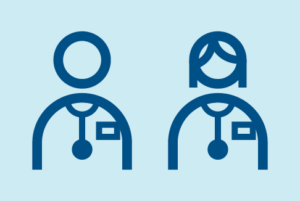The Centers for Medicare & Medicaid Services (CMS) has issued its calendar year (CY) 2023 proposed rule for the physician fee schedule (PFS). Comments on the proposed rule are due by Sept. 6.
Key provisions of the proposed rule include:
- Conversion Factor: The proposed CY 2023 PFS conversion factor is $33.08, a decrease of $1.53 from the CY 2022 PFS conversion factor of $34.61. This reflects the expiration of a 3% statutory payment increase, a 0% conversion factor update, and a budget-neutrality adjustment.
- Evaluation and Management (E/M) Visits: CMS proposes to adopt several changes in documentation and coding requirements for E/M visits, including hospital inpatient, hospital observation, emergency department, nursing facility, home or residence services, and cognitive impairment assessment services. In addition, CMS is proposing to delay the implementation of its policy to define the substantive portion of a split (or shared) visit based on the amount of time spent by the billing practitioner for one year, until Jan. 1, 2024. Under this policy, if a non-physician practitioner performed at least half of an E/M visit and billed for it, Medicare would only pay 85% of the PFS rate.
- Medicare Shared Savings Program: CMS proposes significant changes to the Medicare Shared Savings Program. Among the changes, CMS would modify the calculation methodology for accountable care organizations’ (ACOs) benchmarks to reduce costs and encourage long-term participation in the program. CMS also proposes policies to incentivize new ACOs in rural and underserved areas, including providing advance investment payments. CMS also proposes updates to quality measurement policies, as well as a new health equity adjustment that would award bonus points to ACOs serving higher proportions of underserved or dually eligible beneficiaries. A fact sheet specific to these policies is available on CMS’ website.
- Telehealth: CMS proposes several changes to Medicare telehealth policies to account for statutory changes related to the termination of flexibilities after the end of the COVID-19 public health emergency (PHE). The proposed changes include extending the length of time certain services will remain on Medicare telehealth temporarily to 151 days after the end of the PHE, maintaining originating site- and geographic-restriction flexibilities until 151 days after the end of the PHE, and delaying the in-person visit requirements for mental health services furnished via telehealth until 152 days after the end of the PHE.
- Clinical Laboratory Fee Schedule: As required by the Protecting Medicare and American Farmers from Sequester Cuts Act, CMS proposes to delay the laboratory payment data reporting period to Jan. 1 — March 31, 2023, based on the data collection period of Jan. 1 — June 30, 2019. CMS also proposes to delay phased-in payment cuts to lab rates and proposes certain modifications and clarifications to the Medicare clinical laboratory fee schedule requirements for the travel allowance for specimen collection.
- Behavioral Health Policies: CMS proposes several policies intended to improve access to, and quality of, mental health care services. Specifically, CMS proposes to make an exception to the direct supervision requirements to allow behavioral health services provided under the general supervision of a physician or non-physician practitioner, rather than under direct supervision, when these services or supplies are provided by auxiliary personnel incident to the services of a physician (or non-physician practitioner). CMS also proposes policies to pay psychologists and social workers to help manage beneficiary behavioral health needs as part of the primary care team. A fact sheet specific to CMS’ behavioral health proposals is available on CMS’ website.
- Quality Payment Program: CMS proposes five new, optional Merit-based Incentive Payment System (MIPS) Value Pathways that would be available beginning in 2023. These value pathways align the reporting requirements of the four MIPS performance categories around specific clinical specialties, medical conditions, or episodes of care. CMS also proposes refinements to the MIPS subgroup reporting process, an increase to the quality data completeness threshold, and changes to the requirements and scoring of the Promoting Interoperability category. The proposed rule also includes requests for input on policy ideas for advancing health equity and transitioning to digital quality measurement.
The proposed rule contains numerous additional policies. A CMS fact sheet is available, and CHA will distribute a detailed summary of the proposed rule to members in the coming weeks.



